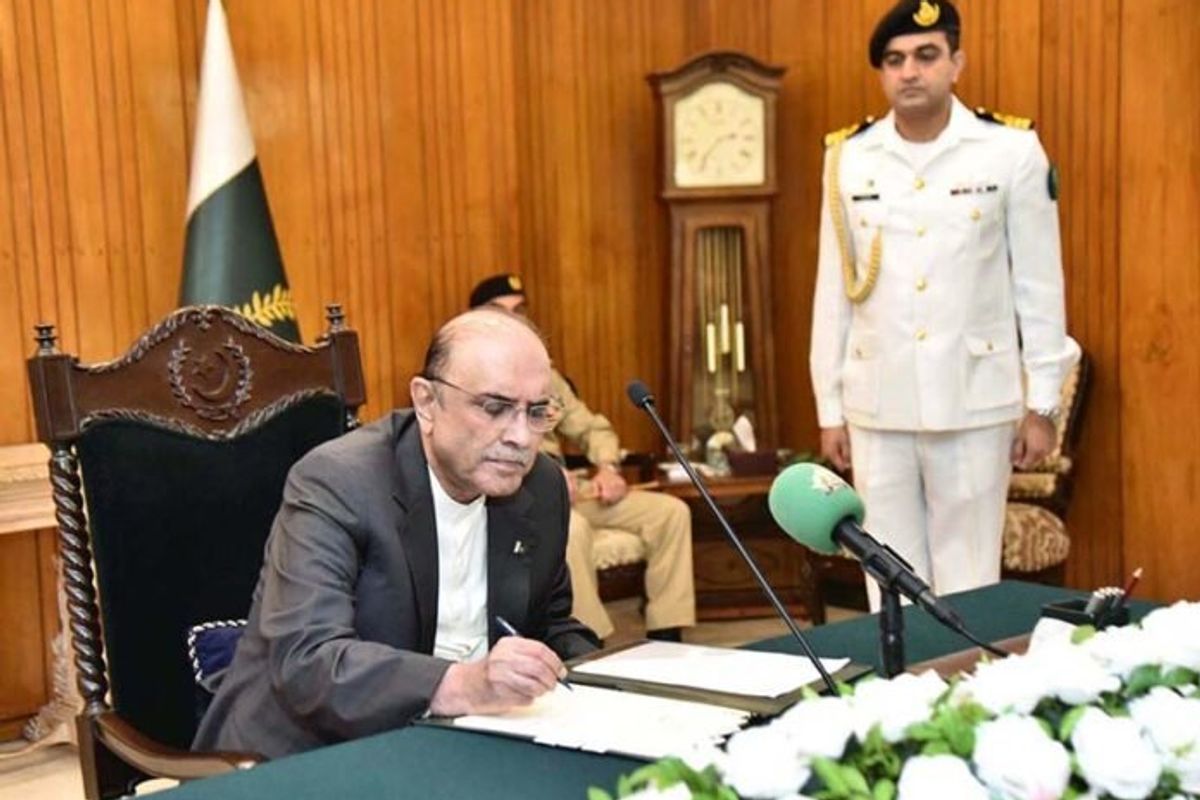News Desk
The News Desk provides timely and factual coverage of national and international events, with an emphasis on accuracy and clarity.
Ali Hamza
Correspondent
Ali; a journalist with 3 years of experience, working in Newspaper. Worked in Field, covered Big Legal Constitutional and Political Events in Pakistan since 2022. Graduate of DePaul University, Chicago.

The amendment became law after President Asif Ali Zardari signed it on November 13, 2025.
Courtesy: APP/File
Pakistan’s 27th Constitutional Amendment received presidential assent on Friday from President Asif Ali Zardari, following its approval by both the National Assembly and the Senate.
The amendment has sparked widespread attention as it reshapes key aspects of the country’s defense and judicial structures.
Under the amendment, the ranks of Field Marshal, Marshal of the Air, and Admiral of the Fleet will be granted legal protection. The legislation also introduces the new post of Chief of Defense Services, approved by the federal cabinet, which will place the army, navy, and air force under a single unified command.
Army Chief Field Marshal Syed Asim Munir will be the first to assume this position and will retain his rank with legal immunity after completing his term.
To implement the amendment, a bill amending six existing laws was passed by the National Assembly and is scheduled for Senate approval.
Earlier in the day, Law Minister Azam Nazeer Tarar reintroduced the amendment in the Senate after it had been approved by the lower house with several changes and a two-thirds majority, despite strong protests from opposition lawmakers.
The Senate session, chaired by Chairman Yousaf Raza Gillani, reviewed the revised text, which aims to restructure elements of Pakistan’s judicial and defense systems. Sixty-four senators voted in favor and four against.
The National Assembly had previously approved the amendment with nine additional clauses, building on the 59 clauses the Senate had passed earlier.
The lower house had cleared the amendment following an intense debate, with the ruling coalition securing 234 votes in favor - 10 more than the 224 needed to amend the Constitution.
- YouTube www.youtube.com
Lawmakers from the Jamiat Ulema-e-Islam-Fazl (JUI-F) voted against the bill, while members of the opposition Pakistan Tehreek-e-Insaf (PTI) boycotted the proceedings and tore up copies of the bill in protest.
Extensive reforms
The 27th Amendment is one of the most extensive constitutional reform efforts in recent years. It establishes a new Federal Constitutional Court (FCC), adjusts the titles and hierarchy of top judges, and modifies several clauses concerning the military command structure and the presidency.
The version now before the Senate differs from the earlier draft approved by the upper house. It fine-tunes the structure of the proposed Federal Constitutional Court and removes several controversial provisions related to the oaths taken by constitutional officeholders.
One of the key revisions relates to Article 6(2A) of the Constitution, which deals with high treason. The updated text adds the “Federal Constitutional Court” to the article, explicitly bringing the new court under its jurisdiction.
Another change, a newly added Clause 2A, amends Article 10(4) on preventive detention to include a reference to the Supreme Court.
- YouTube youtube.com
The National Assembly removed several clauses from the Senate’s earlier version that proposed changes to oaths taken by the president, auditor general, and chief election commissioner. Clauses 4, 19, 51, and 55 — which sought to replace references to the “Chief Justice of Pakistan” with “Chief Justice of the Federal Constitutional Court” — have all been deleted.
A new Clause 23 amends Article 176, clarifying that the current Chief Justice will continue to hold the title “Chief Justice of Pakistan” until the end of his term. Another addition, Clause 56, defines the “Chief Justice of Pakistan” as the senior-most among the Chief Justice of the Federal Constitutional Court and the Chief Justice of the Supreme Court, establishing a formal hierarchy between the two.
Prime Minister Shehbaz Sharif hailed the passage of the amendment, calling it a “historic step for democracy and national unity.” Speaking in the National Assembly, he said the creation of constitutional courts fulfilled a 19-year-old commitment and emphasized that the Chief Justice would continue to head key judicial bodies, including the Judicial Commission and the Supreme Judicial Council.
Sharif praised Pakistan’s security forces for their sacrifices against terrorism and said he would seek consensus with other political parties, including the PPP, on reforms to the 18th Constitutional Amendment and the National Finance Commission Award.
He added that the government would continue to uphold the Constitution and strengthen cooperation between the federation and the provinces.







Comments
See what people are discussing